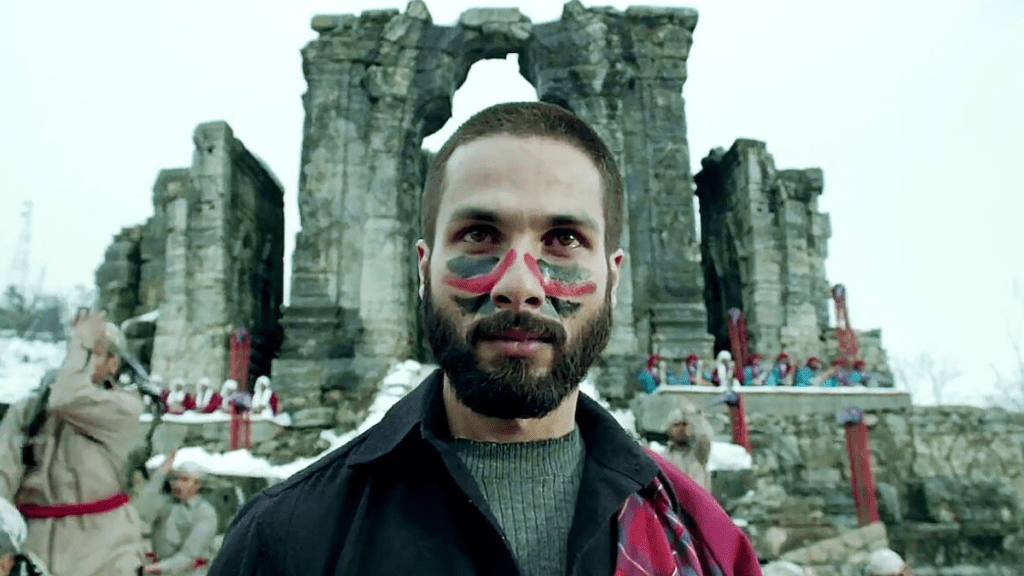Haider is a 2014 Indian Hindi-language crime thriller film, directed by Vishal Bhardwaj. Bhardwaj, along with Basharat Peer, penned the screenplay. The film stars Shahid Kapoor in the titular role. Additionally, Tabu, Kay Kay Menon, Shraddha Kapoor, and Irrfan Khan are also in supporting roles.
Haider is set against the backdrop of the insurgency-hit Kashmir conflicts of 1995. It is a contemporary adaptation of William Shakespeare’s Hamlet. It intertwines the personal and political turmoil in Kashmir, exploring themes of revenge, love, and conflict.
Why was Hilaal arrested?
Dr. Hilaal Meer, a terrorist leader, agrees to perform an appendectomy to save the life of Ikhlaque. To avoid detection by the military, he does it at his own house, offending his wife, Ghazala. This act draws the suspicion of the authorities, leading to a military raid on his home. The raid resulted in the killing of Ikhlaque and the arrest of Hilaal. Following this, the military bombs the house under the assumption that other terrorists might be hiding inside.
Haider, Hilaal’s son, is a young student and poet studying at Aligarh Muslim University. He returns to Kashmir to find answers about his father’s mysterious disappearance. However, to his shock, he finds his mother, Ghazala, seemingly content. He also notices her growing closeness to his uncle, Khurram, who is Hilaal’s brother.
Disturbed by this and driven by the need to find his father, Haider starts a desperate search through various police stations and detention camps. He is aided in his quest by his childhood sweetheart, Arshia Lone, a journalist whose father, Pervez, is a high-ranking police officer.
Who killed Hilaal?
The narrative takes a turn with the arrival of winter in Kashmir. Haider’s frustration grows as he fails to find any leads about his father and witnesses the deepening relationship between his mother and uncle. His hope is rekindled when Arshia meets Roohdaar, a mysterious stranger who tells Haider that both he and Hilaal were imprisoned and that Hilaal was killed on the orders of Khurram. Roohdaar, who miraculously survived, brings Hilaal’s last wish to Haider: avenge his death by killing Khurram.
Tormented by this revelation, Haider’s behavior becomes increasingly erratic. He shaves his head and begins staging public demonstrations against the government. During this time, Khurram, in an attempt to manipulate Haider, alleges that Roohdaar was the one responsible for Hilaal’s death. Haider, despite knowing the truth, finds himself in a moral quandary and shares his concerns with Arshia, revealing his intention to kill Khurram.
The situation escalates when Arshia inadvertently informs her father, Pervez, about Haider’s plans. Pervez relays this information to Khurram, who then arranges for Haider to be institutionalized. On the day of Khurram’s marriage to Ghazala, Haider prepares to assassinate his uncle but refrains from doing so upon seeing him in prayer. He is then captured by Pervez’s men but manages to escape after killing his two captors.
Haider’s journey leads him to contemplate crossing the border into Pakistan for military training, but before he can leave, he meets with Ghazala at the ruins of their family home. She confesses her role in the events leading to Hilaal’s arrest and expresses regret. Meanwhile, Pervez learns of Haider’s whereabouts and attempts to kill him, but Haider kills Pervez first and escapes.
Haider ending: Why did Arshia kill herself?
The tragedy deepens as Arshia, distraught over her father’s death at the hands of Haider, commits suicide. Haider, now fully consumed by the desire for revenge, confronts Khurram and his men at his family’s home. A fierce gunfight ensues, resulting in heavy casualties. In a dramatic turn of events, Ghazala, armed with a suicide vest provided by Roohdaar, sacrifices herself in an attempt to stop the violence, severely injuring Khurram in the process.
In the film’s climax, Haider, standing over a wounded Khurram, recalls his mother’s final words about the futility of revenge. He chooses to spare Khurram’s life, walking away from the carnage. This decision marks a significant departure from the cycle of violence and revenge, offering a glimmer of hope amidst the tragedy.
The film ends on this poignant note, leaving the audience to contemplate the devastating effects of conflict and the power of forgiveness.










